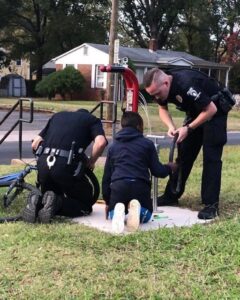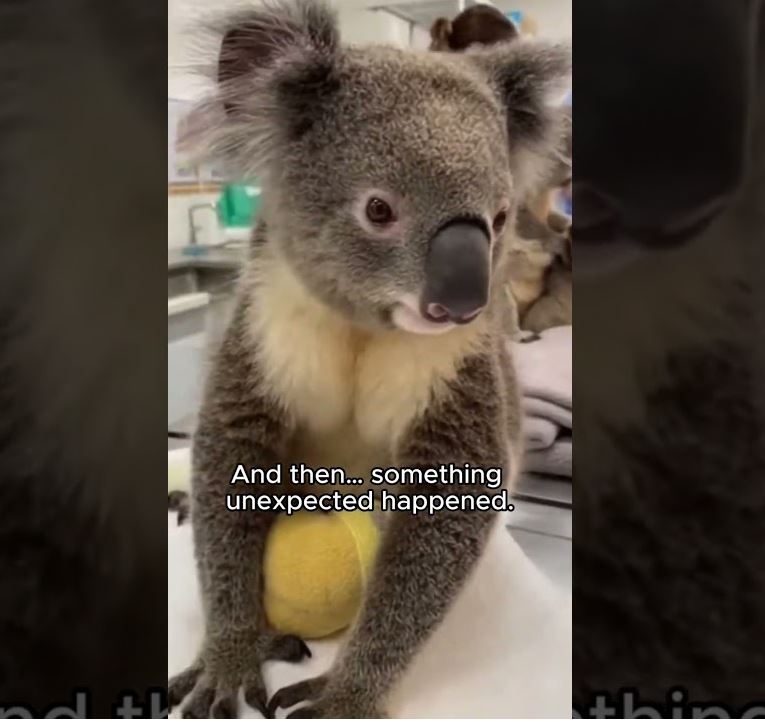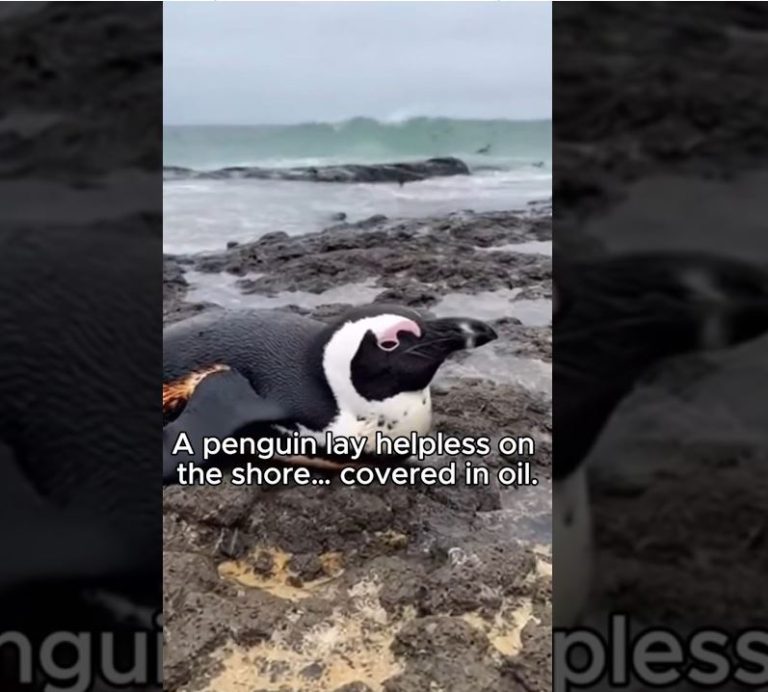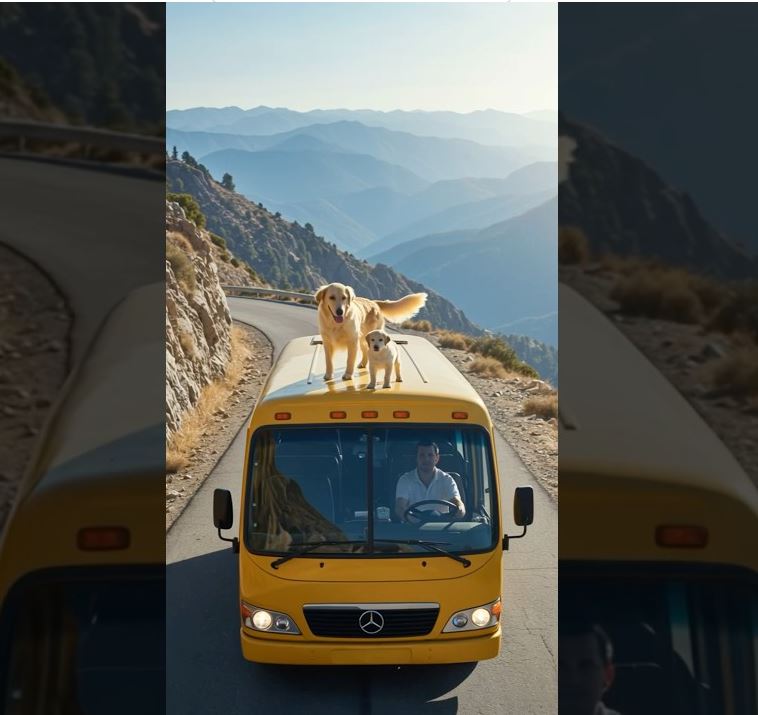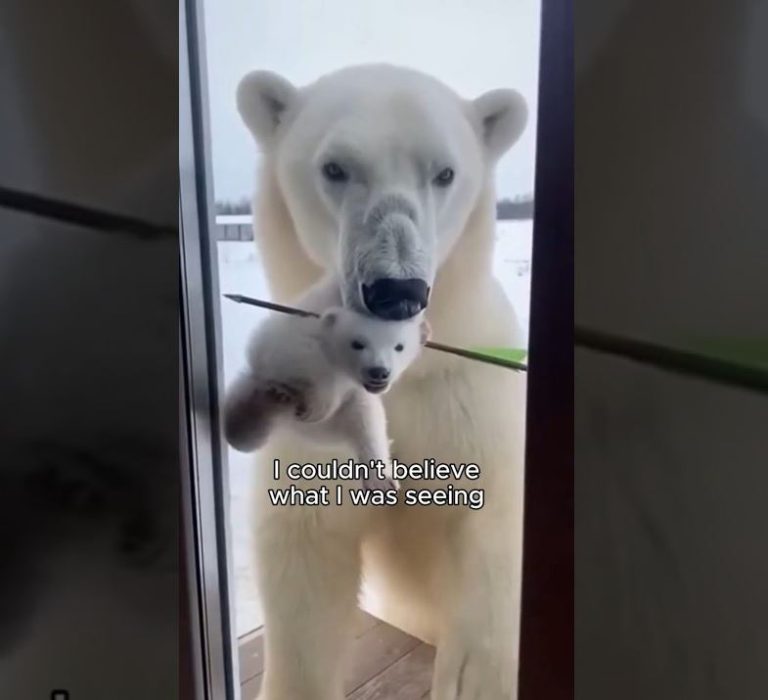I was just trying to fix it myself. My bike chain had popped off—again—and I didn’t have the right tools. So there I was, at the little repair station near the park, kneeling and doing my best to get it back in place.
My hands were greasy, my shoelace had come undone, and every time a car passed, I felt more self-conscious. I didn’t want to ask for help—I just wanted to finish and go home.
Then I heard tires behind me, rolling up slowly over the grass.
It was a police cruiser.
Two officers stepped out. My first thought was, *Am I not supposed to be here?* I stayed focused on the chain, trying not to draw attention.
Then one of them said, calmly and kindly, “Hey, looks like you could use an extra hand.”
I froze.
But before I could say anything, the older officer knelt beside me and studied the chain like he’d done it a dozen times. He didn’t rush. He didn’t judge. He just gave a knowing nod, like, *Yep, this one’s being tricky.*
“Uh… yeah,” I stammered. “It popped off. I was trying to get it back on.”
“Mind if I give it a go?” he asked.
I stepped back, a little embarrassed, but grateful. “Sure.”
He worked in silence for a few minutes, using a small multi-tool from his pouch. The younger officer stayed nearby, keeping a lookout, but also offered a few encouraging words as I sat on the bench behind them.
“You ride this often?” he asked.
“Yeah,” I said. “It’s how I get to school and work.”
The older officer nodded, gently adjusting the chain. “Looks like it’s a bit worn. Might be time to replace it soon.”
“I know,” I admitted. “Just been putting it off.”
A few more minutes passed. Then, with a satisfied nod, he stood up. “Give it a spin.”
I turned the pedals slowly—and the chain rolled like new. I couldn’t help but smile.
“Thanks,” I said, unsure how to express how much it meant.
“No problem,” he replied, wiping his hands. “You’re all set.”
As they walked back to their cruiser, the younger officer turned and said, “Next time, don’t be afraid to ask for help. People surprise you.”
I nodded. “Yeah… I guess they do.”
That moment stuck with me. It wasn’t just that they fixed my bike—it was how they treated me. With kindness, patience, and no assumptions.
A few days later, I saw a kid sitting outside the grocery store, struggling with a skateboard that had lost a wheel. I almost walked past. Then I remembered the officers.
“You need help?” I asked.
The kid looked up. “I think so.”
I crouched down and helped him fix it using a key from my bike tool. Then I handed him a bottle of water from my bag. He grinned. “Thanks, man.”
It felt simple—but good.
From then on, I started noticing more. Someone with heavy bags on the bus. A person trying to pick up dropped groceries. An elderly man reaching for the top shelf. I started stepping in.
Not for praise—just because it felt right.
One rainy day, I saw a woman carrying two big bags across a parking lot. I ran over, holding my umbrella.
She looked at me, cautious. “You’re not trying anything funny, are you?”
I smiled. “No ma’am. Just didn’t want you to slip.”
She laughed, handed me one bag, and said, “Alright. But I’ve got pepper spray, just in case.”
We made it to her car without any mishaps—and she thanked me with a warm smile.
Not long after, I saw someone broken down on the side of the road. Normally, I would’ve kept riding. But something told me to stop.
His phone was dead, and he was trying to get to his sister’s graduation. I let him use my phone to call a tow truck—but it wouldn’t arrive in time.
“You won’t make it unless you leave now,” I said. “Take my bike.”
“Seriously?”
“Yeah,” I said. “Go. I’ve got strong legs and zero shame. You’ll make it.”
And he did—just in time to see her walk across the stage.
Later, he called to thank me. Said his sister wanted to meet me. We met at the park where my chain had first broken. She brought cupcakes—dry, but very sweet in gesture.
“You probably don’t know this,” she said, “but that day meant a lot to my brother. He was having a rough time. Your kindness reminded him that good people still exist.”
That stuck with me.
Eventually, I saved up for a new bike. But I didn’t throw the old one away—I fixed it up and gave it to a kid who walked four miles to school every day. He hugged me without saying a word.
The city even added a small community toolbox by the bike repair stand. I donated my tools and some spare parts. Sometimes I sat nearby, just in case someone needed help.
One day, the same two officers stopped by again.
The older one looked around and smiled. “Looks like you’ve been busy.”
I nodded. “Just paying it forward.”
He chuckled. “That’s the way.”
Before they left, he handed me a small pin—shaped like a chain link.
“For good connections,” he said.
I still keep it in my wallet.
One evening, I saw a man and a teenager arguing loudly. People kept their distance, unsure whether to step in. I did.
“Hey,” I said gently. “Everything alright?”
There was tension at first—but we talked it out. Turns out the man was his uncle, and they were working through a tough situation. The teen’s name was Dorian. He was just overwhelmed. I gave him my number and said I’d check in.
Now we get burgers once a month. He wants to be a social worker someday.
Sometimes I think about how all of this began—with a broken bike chain and two officers who offered help without judgment.
Kindness isn’t loud. It’s quiet, steady, and often unexpected.
But when it shows up, it changes things.
So if you see a chance to help—take it.
Even the smallest actions can start a ripple.
**If this story reminded you of someone who helped you in an unexpected moment, share it. You never know who might be inspired to start their own ripple.*
